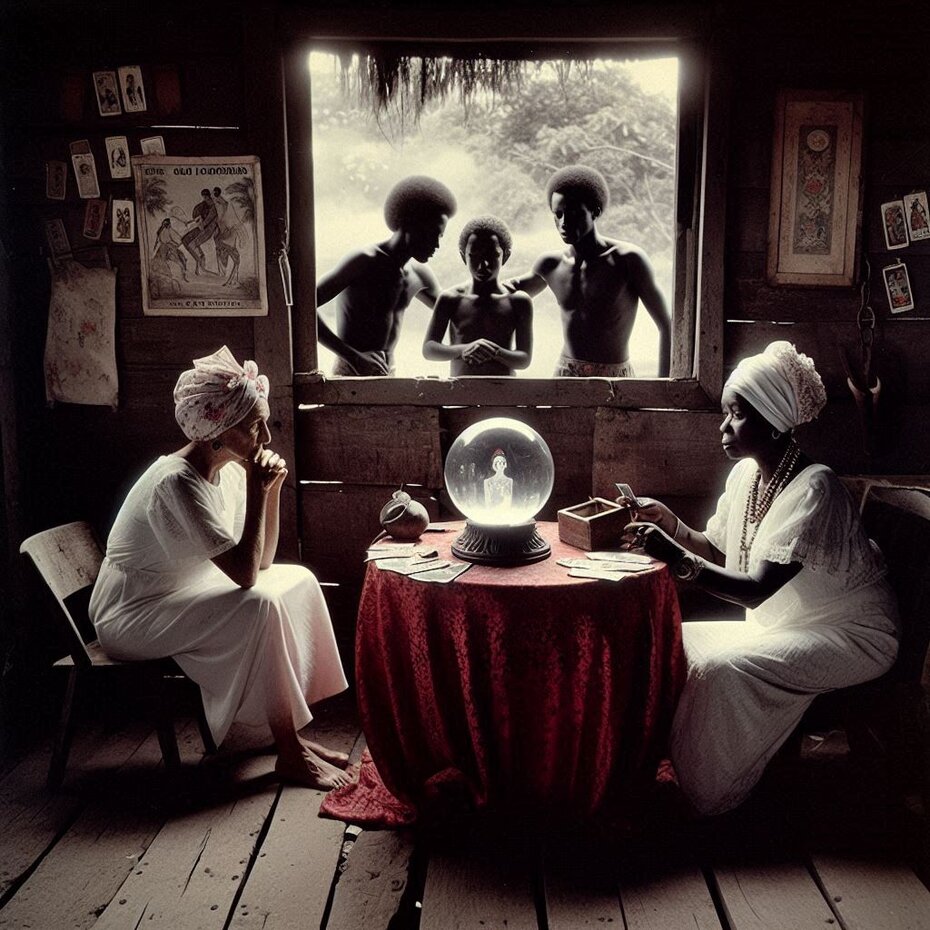What did Berenice tell me?
Last year, at this same time, she was getting ready to watch the parade of carnival groups on Avenida Borges de Medeiros. Newly arrived from Rio de Janeiro, carnival was no longer restricted to the city's clubs. Whites and blacks watched together as the passistas performed on the asphalt in the city center, singing the fashionable marchinhas. Her mother, unaware of the dangers that surrounded unaccompanied girls in that perilous environment, had let Berenice watch the parade in the city center. Alone in a crowd of lustful men, accompanied only by her best friend, she had felt grown-up and important.

But this year, alerted by her neighbors, Mrs. Olimpia had forbidden Berenice to attend the samba school parades. Instead, her mother had given her instructions on how to get to her new employer's house. At 17, she was about to get her first job.
Following her mother's explanations, Berenice went down the hill, crossed Plínio Avenue and started walking up Auxiliadora Street. She walked with her eyes wide open, observing everything around her with fear: although her new job was close to home, it seemed like another world. Until then, she had hardly ever left the quilombo, spending all her days at home, busy with household chores or serving coffee to her mother's clients. Despite her fear, she knew that everything would work out, because that's what her mother had said. And when Dona Olímpia said something with that strange look on her face, with her half-closed eyes and the air of someone listening to an exu's confidences, she could believe it was true.
Dona Olímpia was the most sought-after psychic in the Montserrat Basin. Madams came from far and wide to consult with her and learn what fate awaited them. It was worth climbing the dirt track and getting your heels covered in the mud that formed around the washerwomen who, scattered around the stream, washed their customers' clothes in wooden tubs. When they entered Dona Olímpia's house, her customers had the impression of stepping through a portal into another world. Although it was a wooden hovel with a zinc roof, its walls were decorated with images of saints and, on the table covered with a red satin cloth in the center of the piece, a crystal ball announced to the unwary that this was no ordinary place. This was the kingdom of the orishas.
A few days earlier, a new client who lived in the neighborhood had shown up at her door. She looked tired, like someone who had recently become a mother. But unhappy with her current life, she had come hopeful in search of news of a better future.
- But how could I tell her what I saw in the cards, Berenice? Tired from her daily housework and caring for her newborn daughter, she was thirsty for adventure and a little romance. But all I saw in the letters was loneliness and work. On the way out, while she was paying for the fortune-telling, I asked her if she wouldn't be interested in some help with the housework. I mentioned you, my child. I said you were looking for a job. What's that, girl? Don't make that crying face! You're going to do the same thing at her house that you already do here. Go, go, she'll be waiting for you by now. You can't go wrong, it's the only building on the street.

A little later, Berenice and Nair looked at each other curiously through the ajar door. The future boss noticed the tall, skinny girl, with thin shins, who wore only a thin dress over her body, unsuitable for the harsh winter of southern Brazil. With her heavy-framed glasses, her hair up in a bun and her face serious, Nair quickly explained the tasks and then took Berenice to the laundry area, next to the brooms and buckets, before leaving to attend to the child who had been crying at the top of her lungs since the doorbell rang. The work was simple: all she had to do was clean the house. Dona Nair would be in charge of preparing the food and looking after the baby.
Neither mistress nor maid spoke much. To put an end to the discomfort caused by the silence in the house, Berenice bought a small battery-operated radio as soon as she received her first paycheck. From then on, she spent every day listening to music while she worked. The tranquillity was only interrupted when the baby started screaming for attention, which was invariably accompanied by the noise made by the downstairs neighbor, banging his broomstick on the ceiling to vent his anger. As soon as Dona Nair left the house, Berenice would rush over to hold the child in her arms:
- There, there, no more crying. What kind of strange people are these, who let a little baby cry itself to sleep just because someone wrote a book saying that's how you bring up a child, eh, my little milk loaf? -she said, hugging the baby to her chest.
Berenice's heart was full of pent-up love, ready to give. She was still a little girl when she was given to Dona Olímpia by her biological mother. The latter, unable to reconcile her unruly nightlife with her role as a mother, chose the psychic to replace her, as she was an honest woman with a good heart, even if she was a little distant. With her soft-spoken and quiet manner, Berenice grew up alone, in the shadows.
Now seventeen, she felt for the first time how important she was in someone's life, and she reciprocated Inês' affection by teaching her precious lessons: that bananas taste like tutti frutti when they are eaten whole, all the way through; that rain cakes can only be prepared in special weather conditions, that on a naughty day, children only deserve watery stews and that Roberto Carlos' music should be danced to clinging to your partner, leaning on the feet of whoever is leading the dance. When Inês was 15, Berenice started seriously dating an employee of the urban cleaning company, and a few months later, she agreed to marry that serious, self-absorbed guy she had been seeing.
- And is he white, Berenice?" asked Dona Nair, when she came to ask for the accounts.
She had decided to stop working as a maid after her marriage. From now on, she would finally take care of her own home!
- God forbid, Mrs. Nair. How disgusting!
That day, she gave Inês a tight hug and whispered a few words of farewell in her ear.
- What did she say to you, my child? - asked Nair just after Berenice had left.
- I don't know, Mom. I was so shocked by the farewell that I didn't even hear it properly. What's it going to be like now? Where will we find her when we miss her? She's always been part of the family... Nair, jealous, grunted and went off to deal with practical matters. It would be dinner time soon.
Two years later, Berenice showed up to pay a visit and introduce her newborn son. Full of zeal, she passed the baby into Inês' arms, while announcing with a wink:
- He's called Maximiliam - and the two of them immediately burst into laughter in front of Nair, who didn't understand anything that was going on between them.
Maximiliam was the name of their favorite photonovel's leading man, whom Ines had kept as a souvenir among the literary classics. As they drank coffee and competed for the baby's attention, they reminisced about the time they fought over who would have the honor of being the first to read the novel published that week and dream of a fairytale future. Since Berenice's departure, the photonovels had lost much of their fun. But who knows what life had in store for them? If only Dona Olímpia were still alive to tell them!
When it was time to say goodbye, with the door almost closed, Inês remembered the question that had been bothering her for so long:
- Do you remember what you said to me the day you left, Berenice?
Shyly, she played with the baby blanket she was carrying on her lap, as she plucked up the courage to speak.
- When I turned fifteen, my mother laid out the cards for me and predicted that I would have two children: one white and one black. On that day I left, I told you that I was leaving your home, but that I would carry you in my heart forever.
Translated with DeepL.com (free version)
Translated with DeepL.com (free version)
Voltar
